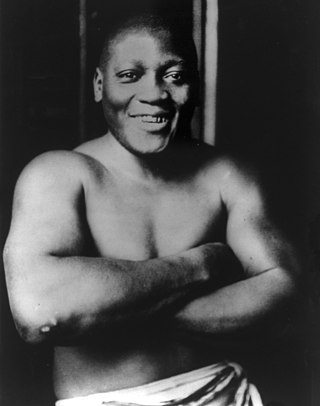
John Arthur Johnson, nicknamed the "Galveston Giant", was an American boxer who, at the height of the Jim Crow era, became the first black world heavyweight boxing champion (1908–1915). His 1910 fight against James J. Jeffries was dubbed the "fight of the century". Johnson defeated Jeffries, who was white, triggering dozens of race riots across the U.S. According to filmmaker Ken Burns, "for more than thirteen years, Jack Johnson was the most famous and the most notorious African American on Earth". He is widely regarded as one of the most influential boxers in history. Transcending boxing, he became part of the culture and history of racism in the United States.

John Ruiz is an American former professional boxer who competed from 1992 to 2010, and held the WBA heavyweight title twice between 2001 and 2005. Ruiz is of Puerto Rican descent, and is the first Latino boxer to win a world heavyweight title.
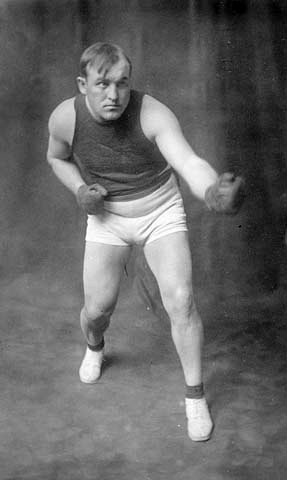
Tommy Burns was a Canadian professional boxer. He is the only Canadian-born World Heavyweight Boxing Champion. The first to travel the globe in defending his title, Burns made 13 title defences against 11 different boxers, despite often being the underdog due to his size. Burns took on all challengers as Heavyweight Champion, leading to his legendary bout with the African American Jack Johnson. According to his biographer, Burns insisted, "I will defend my title against all comers, none barred. By this I mean white, black, Mexican, Indian, or any other nationality. I propose to be the champion of the world, not the white, or the Canadian, or the American. If I am not the best man in the heavyweight division, I don't want the title."
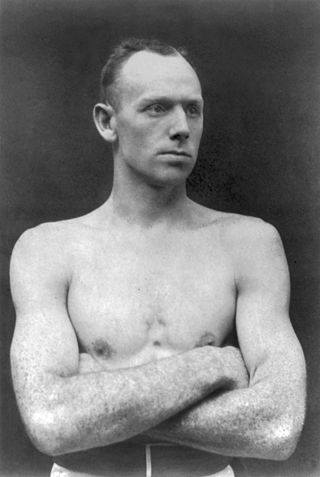
Robert James Fitzsimmons was a British professional boxer who was the sport's first three-division world champion. He also achieved fame for beating Gentleman Jim Corbett, and he is in The Guinness Book of World Records as the lightest heavyweight champion, weighing just 167 pounds when he won the title. Nicknamed Ruby Robert and The Freckled Wonder, he took pride in his lack of scars and appeared in the ring wearing heavy woollen underwear to conceal the disparity between his trunk and leg-development.

James John Corbett was an American professional boxer and a World Heavyweight Champion, best known as the only man who ever defeated John L. Sullivan. Despite a career spanning only 20 bouts, Corbett faced the best competition his era had to offer, squaring off with a total of nine fighters who would later be enshrined alongside him in the International Boxing Hall of Fame.

James Jackson Jeffries was an American professional boxer and world heavyweight champion.

Harry Wills was a heavyweight boxer who held the World Colored Heavyweight Championship three times. Many boxing historians consider Wills the most egregious victim of the "color line" drawn by white heavyweight champions. Wills fought for over 20 years (1911–1932), and was ranked as the number-one challenger for the world heavyweight championship, but was denied the opportunity to fight for the title. Of all the black contenders between the heavyweight championship reigns of Jack Johnson and Joe Louis, Wills came closest to securing a title shot. BoxRec ranks him among 10 best heavyweights in the world from 1913 to 1924, and as No.1 heavyweight from 1915 to 1917 and many regard him as one of the greatest heavyweights of all time.

Thomas "Sailor Tom" Sharkey was a boxer who fought two fights with heavyweight champion James J. Jeffries. Sharkey's recorded ring career spanned from 1893 to 1904. He is credited with having won 37 fights, 7 losses, and 5 draws. In 1953, Sharkey was named in Ring Magazine's list of 100 greatest punchers of all time.

Joseph Bartlett Choynski was an American boxer who fought professionally from 1888 to 1904.

John Joseph Killion, more commonly known as Jake Kilrain, was a famous American bare-knuckle fighter and glove boxer of the 1880s.
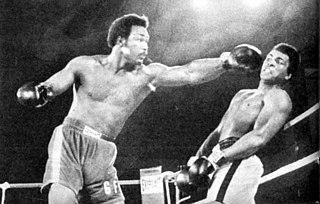
Professional boxing, or prizefighting, is regulated, sanctioned boxing. Professional boxing bouts are fought for a purse that is divided between the boxers as determined by contract. Most professional fights are supervised by a regulatory authority to guarantee the fighters' safety. Most high-profile bouts obtain the endorsement of a sanctioning body, which awards championship belts, establishes rules, and assigns its own judges and referees.
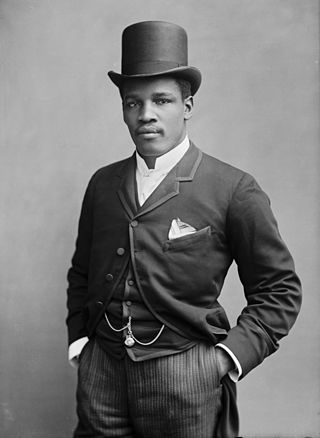
Peter Jackson was an Australian heavyweight boxer who had a significant international career. Jackson was inducted into the International Boxing Hall of Fame in the inaugural 1990 class, as well as being the 2004 inductee for the Australian National Boxing Hall of Fame in the Pioneers category.

Peter Maher was an Irish boxer known for his powerful punch. Early in his career Maher won the 1888 Middleweight Championship of Ireland, and the 1890 Heavyweight Championship of Ireland. After moving to the United States he won the 1895 Heavyweight Championship of the World match by knocking out Steve O'Donnell in the first round. In 1896 Bob Fitzsimmons defeated Maher in a fight in Coahuila de Zaragoza, Mexico, and took the disputed heavyweight title.
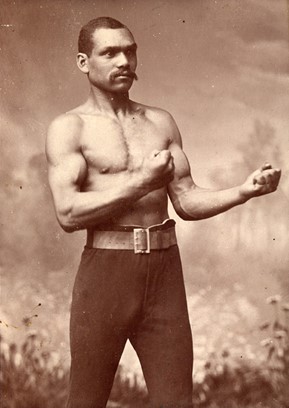
George Godfrey, nicknamed Old Chocolate by the press of the day in the last stage of his long career, was a Black Canadian heavyweight boxer who held the distinction of being World 'Colored' Heavyweight Champion during his career. Godfrey was inducted into the PEI Sports Hall of Fame in 1990.

George Gardiner was a famous Irish boxer in America who was the first undisputed World Light Heavyweight Champion. He held claims to both the World Middleweight Title as well as the World Heavyweight Title. He was the second man in history to hold the World's Light Heavyweight title, defeating the first Light Heavyweight Champion, Jack Root, by KO after 12 rounds.

Bob Armstrong, was a heavyweight boxer known as the "King of the Battle Royal". He was born in Rogersville, Tennessee, but he moved with his family to Washington, Ohio when he was three years old.
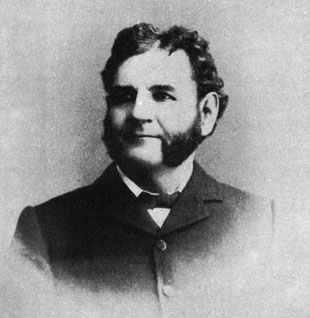
Laurence 'Larry' Foley was an Australian middleweight boxer. An exceptional boxing instructor, his students included American champions Peter Jackson, and Tommy Burns, the incomparable English-born triple weight class champion Bob Fitzsimmons and Australian champion Mike Dooley. Due to his success as a boxing champion and internationally acclaimed instructor, and for introducing his country to the modern Queensberry Rules, he is often referred to as the "Father of Australian Boxing".
The Fitzsimmons vs Sharkey Heavyweight Championship boxing match between Bob Fitzsimmons and Tom Sharkey was awarded by referee Wyatt Earp to Sharkey after Fitzsimmons knocked Sharkey to the mat. Earp ruled that Fitzsimmons had hit Sharkey below the belt, but very few witnessed the purported foul. The fans at the December 2, 1896 fight in San Francisco booed Earp's decision. It was the first heavyweight championship fight since James J. Corbett, the prior champion, had retired from boxing the year before. The fight may have been the most anticipated fight in the US that year.

Frank Patrick Slavin, also known as "Paddy" Slavin, was an Australian heavyweight boxer. He was a pioneer of prizefighting in his country, fighting under the tutelage of Larry Foley.


















